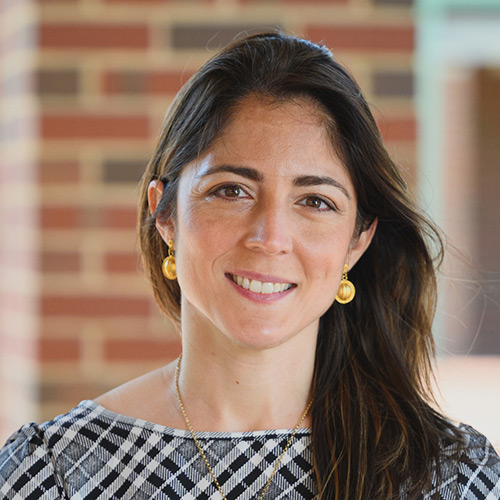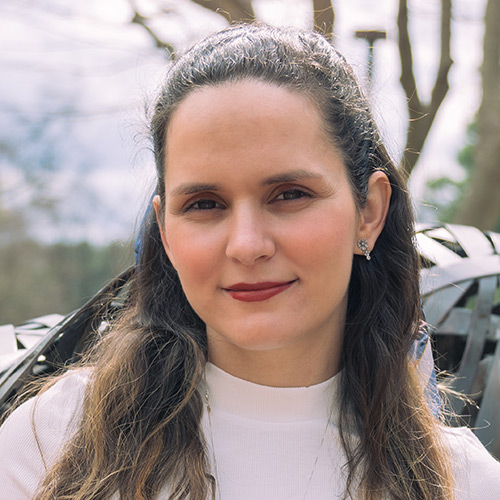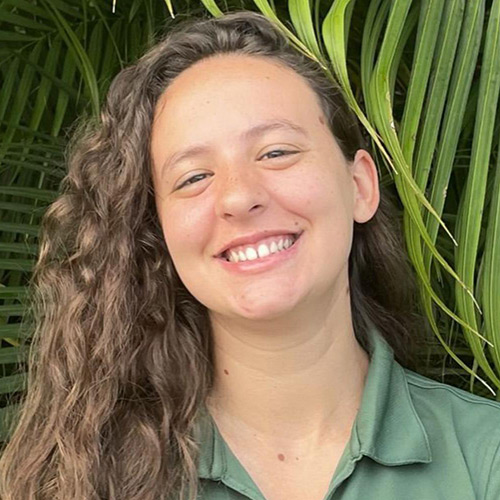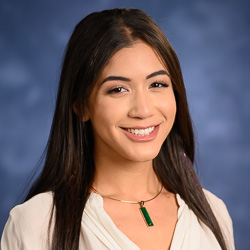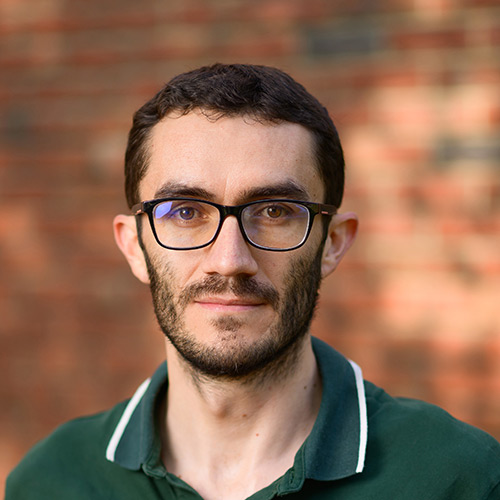Intestinal Regenerative Medicine
Gonzalez Lab
Lab Contact: 919.513.6919 | X (Twitter) | ResearchGate
Overview

Liara Gonzalez, an associate professor of gastroenterology and equine surgery at the North Carolina State University College of Veterinary Medicine, leads a team that utilizes large animal, translational models to drive research aimed to better understand intestinal ischemia reperfusion injury and develop clinical therapies to enhance intestinal repair. She was the first to develop a large animal porcine model to study intestinal stem cells and to identify these cells in horses.
She and her team leverage 3-D organoid and 2-D monolayer cultures from pigs and horses to enhance their scientific approaches. In recent years, the team has become passionate about improving the outcome of patients who require intestinal transplantation and has made significant advances in developing normothermic machine perfusion as the preferred method for intestinal allograft storage.
“Helping patients with intestinal disease, no matter if they have two or four legs, inspires and drives me every day.” –Dr. Liara Gonzalez
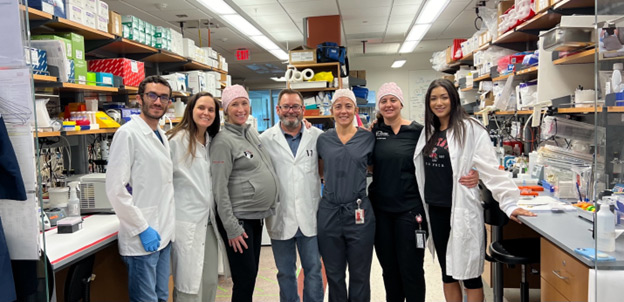
Ongoing Research
Intestinal disease is severely debilitating to both veterinary and human patients. In horses, colic is the leading known cause of death apart from old age. Additionally, gastrointestinal diseases affect approximately 60 to 70 million Americans annually. One of the most dangerous forms of intestinal disease that afflicts both humans and animals is intestinal ischemia and reperfusion injury, which results in a lack of blood flow to the intestine. Ischemia reperfusion injury also causes significant injury to intestinal allografts which results in transplant failure.
In the Gonzalez lab, intensive study is underway to make normothermic machine perfusion a clinical reality for intestinal transplant patients and to understand and harness the therapeutic potential of intestinal stem cells.
“Working with horses suffering from colic and their loving and dedicated owners has been the driving force to improve the medicine we have to offer. The reality is that there has been a failure to develop new, innovative therapies despite the fact that colic is the leading cause of death from disease in horses.
The potential to make a difference excites me. ” —Dr. Liara Gonzalez
Faculty
Dr. Liara Gonzalez, DVM, PhD, DACVS is a veterinarian, specialty trained in large animal surgery, with a clinical and research focus on intestinal disease. Dr. Gonzalez’ research has aimed to develop and utilize large animal models to translate lab bench findings into clinically relevant therapeutic interventions that benefit both human and veterinary patients.
She is particularly interested in identifying improved means to determine tissue viability following severe intestinal injury, studying the role of intestinal stem cells in modulating mucosal barrier repair following ischemic damage, and developing normothermic machine perfusion to improve intestinal transplant patient outcome. The research done in her lab has created the groundwork to utilize porcine tissue for the study of intestinal stem cells including porcine crypt isolation and 3D culture. Ongoing work utilizes the tools developed to ask basic science questions, test novel biologics, and advance therapeutic options for patients suffering from severe intestinal disease. Dr. Gonzalez is driven to apply her knowledge and expertise in advanced laboratory techniques to solve clinically significant problems and further elucidate therapeutic targets to ultimately improve patient survival. Outside of work, Dr. Gonzalez enjoys her family, rowing, horseback riding, and travel.
Staff
John Freund joined the Gonzalez lab in June of 2015. He studied Molecular Biology at Westminster College before post graduate education in Forensic science at at Duquesne University and in Bioengineering at the University of Pittsburgh. John brings 20 years of hands-on laboratory experience to the Gonzalez lab . Before moving to Raleigh, John was a lab manager at the McGowan Institute for Regenerative Medicine in Pittsburgh and at West Virginia University. John is a native of Pittsburgh, PA and a life long Steelers fan. He and his wife Janice enjoy their rescue dog, riding motorcycles, fishing and boating.
Dr. Caroline McKinney-Aguirre DVM, MPH, PhD, Diplomate of the American College of Veterinary Medicine is a Research Assistant Professor and Clinical Trials Fellow who earned her PhD with Dr. Liara Gonzalez in August 2024. Caroline is originally from Ridgefield, Connecticut though did most of her growing up in Naperville, Illinois. Caroline attended Vanderbilt University for her undergraduate studies (B.A. in Medicine, Health, and Society), where she also met her now husband, Joe. Following Vanderbilt, Caroline simultaneously completed her doctorate in veterinary medicine (DVM) and master’s in public health (MPH) at the Tufts Cummings School of Veterinary Medicine and Tufts University School of Medicine, respectively (2016). She then returned to Nashville, TN for a one year-rotating internship at Tennessee Equine Hospital before making the trip back to Massachusetts to complete her Large Animal Internal Medicine Residency at Tufts. Caroline is passionate about the role of intestinal stem cells and their interaction with elements of the intestinal microenvironment, like bacteria. Caroline aspires to remain in academia for her career with appointments in research, teaching, and clinical service. When not in the laboratory, Caroline enjoys riding horses, exploring new bakeries, and spending time outside with her husband, son, and dog.
Dr. Elizabeth Goya-Jorge is a Senior Scientist working as a postdoctoral fellow in the Gonzalez Lab since January 2024. Elizabeth grew up in Santa Clara, Cuba. She graduated as a summa cum laude PhD in Pharmaceutical Chemistry from the University of Valencia (Spain) in 2020, under the prestigious Marie Curie fellowship awarded by the European Commission. Elizabeth then moved to Belgium to work as a Postdoctoral Researcher in the Faculty of Veterinary Medicine of the University of Liège. For 2 years she was at the Department of Food Science, leading the research work in a lab specialized in complex dynamic in vitro simulations (SHIME®) of the gut microbiota of humans and other animals (e.g., pigs, horses). She then spent 1 year in the Laboratory of Immunology and Vaccinology studying the science behind mRNA vaccines and their potential applications in veterinary sciences using rodents and fish as animal models. As a pharmacologist, Elizabeth is passionate about molecular biology and the deep mechanistic knowledge biotechnological methods can unlock. In the Gonzalez Lab, her research interest is to leverage the regenerative capacity of intestinal stem cells to improve small intestine transplantation. In her spare time, Elizabeth enjoys family time, photography, and traveling.
Dr. Carla López Cruz is originally from Seville, Spain. She joined the Gonzalez lab as a Research Fellow in August 2024. She earned her DVM degree from the University of Córdoba in 2017 and completed her clinical term at Texas A&M University. After receiving her degree, Carla traveled to the US for a one-year equine sports medicine and surgical internship at Oakridge Equine Hospital (Oklahoma), followed by a second rotating internship at Rood and Riddle Equine Hospital (Florida). In the Gonzalez lab, Carla will manage normothermic machine perfusion both for the use of intestinal transplantation in porcine models and equine intestinal studies as well. She is also completing several clinical equine projects which align with her surgical interests. Carla is passionate about equine medicine and aspires to become an equine surgeon. Outside of her professional life, she enjoys spending time with family and friends, playing the piano, and riding horses as much as she can.
Graduate Students
Lydia Poisson is a DVM/PhD student studying Immunology under NC State’s Comparative Biomedical Sciences program. Originally from Long Island, she moved to Cary, NC with her family and has spent most of her life here since. Lydia completed her Bachelor’s in Biology with a minor in Chemistry at Howard University in Washington, DC (Class of 2017). After college, her work in laboratory animal medicine eventually inspired her to pursue NC State’s combined degree program. Lydia joined the Gonzalez Lab in 2022, and her research focuses on the innate and adaptive immune responses within intestinal allografts destined for transplantation. Her thesis work investigates whether normothermic machine perfusion can mitigate the inflammatory response, thereby improving transplant outcomes. Upon completing her doctoral training, Lydia plans to pursue a residency in anatomic pathology, with the ultimate goal of integrating her research background and veterinary insight to improve studies using animal models. Outside the lab, Lydia enjoys spending time with family and friends, and some of her many favorite activities include drawing, exploring cuisine, horseback riding, cheering for her Boston sports teams, and doting on her ball python, Regina George, and her beloved dog, Dixie.
Juan Pesantez-Valdivieso DVM, MSc joined the Gonzalez Lab as a PhD student in August 2024. He is originally from Quito-Ecuador, where he obtained a degree in Veterinary Medicine from Universidad Central del Ecuador in 2013, followed by a brief period in small animal practice. In 2015, he completed a master’s degree in Animal Bioscience at the Roslin Institute of the University of Edinburgh, where he participated in the project ‘Exploring new sources of mesenchymal stem cells in horses’. He then returned to Ecuador where he took up a full-time teaching position at Universidad de las Americas (UDLA). At UDLA, he guided and mentored his students not only in classes but also in their thesis work. In the Gonzalez Lab, Juan will be exploring the capacity of normothermic machine perfusion to improve intestinal allograft health before transplantation. Juan is a coffee enthusiast and hopes to be a non-professional barista.
Alumni
Graduate Students
- Amy Stieler Stewart, DVM, PhD, DACVIM-LA – Assistant Professor NCSU
- Brittany Veerasammy, BVM&S, MRCVS, MS – Surgery Residency, University of Tennessee
- Cecilia Kucera, DVM, PhD – Assistant Professor Wake Forest University
- Elsa Ludwig, DVM, MS, PhD, CVA, DACVS-LA – Clinical Instructor NCSU
Undergraduates
- Abhishek Singh, 2022-2024
- Nia Brown, 2022-2023
- Latrell Vample, 2021-2022
- Ian Boyd, 2021-2022
- Destiny Sarno, 2021-2022
- Amber Hazzard, 2020-2021
- Mallory Thomas, 2020-2021
- Seth Kodikara, 2020-2021
- Nichol Henderson, 2017-2021
- Anna Smith, 2016-2017
- Justin Davidson, 2016-2017
- Anya Trell, 2016
- Alice Brown, Summer 2015
- Madison Voight, 2014-2015
- Asia Hilliard, 2014-2015
Veterinary Students – Summer Research Interns
- Sydney Lierz, 2024
- Mara Ramos Cabrera, 2023
- Ariana Antezana (Michigan State University), 2023
- Carlos Falto Zeno, 2022
- Kerry O’Donnell, 2021-2022
- Natalia Rosa Padilla, 2021
- Hannah Jones, 2021
- Daianette Lopez, 2020
- Sara Tufts, 2018-2019
- Patricia Baez-Ramos, 2018-2019
- Gabriel Gonzalez, 2017-2019
- Madison Voight, 2016
Publications
- Ludwig EK, Abraham N, Schaaf CR, McKinney CA, Freund J, Stewart AS, Veerasammy BA, Thomas M, Cardona DM, Garman K, Barbas AS, Sudan DL, Gonzalez LM. Comparison of the effects of normothermic machine perfusion and cold storage preservation on porcine intestinal allograft regenerative potential and viability. Am J Transplant. 2024 Apr;24(4):564-576. doi: 10.1016/j.ajt.2023.10.026. Epub 2023 Oct 31. PMID: 37918482; PMCID: PMC11082874.
- Veerasammy B, Gonzalez G, Báez-Ramos P, Schaaf CR, Stewart AS, Ludwig EK, McKinney-Aguirre C, Freund J, Robertson J, Gonzalez LM. Changes in equine intestinal stem/progenitor cell number at resection margins in cases of small intestinal strangulation. Equine Vet J. 2023 Nov;55(6):995-1002. doi: 10.1111/evj.13927. Epub 2023 Feb 9. PMID: 36716291; PMCID: PMC10387127.
- Schaaf CR, Polkoff KM, Carter A, Stewart AS, Sheahan B, Freund J, Ginzel J, Snyder JC, Roper J, Piedrahita JA, Gonzalez LM. A LGR5 reporter pig model closely resembles human intestine for improved study of stem cells in disease. FASEB J. 2023 Jun;37(6):e22975. doi: 10.1096/fj.202300223R. PMID: 37159340; PMCID: PMC10446885.
- Ludwig EK, Hobbs KJ, McKinney-Aguirre CA, Gonzalez LM. Biomarkers of Intestinal Injury in Colic. Animals (Basel). 2023 Jan 7;13(2):227. doi: 10.3390/ani13020227. PMID: 36670767; PMCID: PMC9854801.
- Gonzalez LM, Stampley AR, Marcellin-Little DJ, Kedrowicz AA. Respondents to an American College of Veterinary Surgeons diplomate survey support the promotion of diversity, equity, and inclusion initiatives. J Am Vet Med Assoc. 2023 Aug 22;261(12):1847-1852. doi: 10.2460/javma.23.06.0310. PMID: 37607676.
- Tse LV, Meganck RM, Araba KC, Yount BL, Shaffer KM, Hou YJ, Munt JE, Adams LE, Wykoff JA, Morowitz JM, Dong S, Magness ST, Marzluff WF, Gonzalez LM, Ehre C, Baric RS. Genomewide CRISPR knockout screen identified PLAC8 as an essential factor for SADS-CoVs infection. Proc Natl Acad Sci U S A. 2022 May 3;119(18):e2118126119. doi: 10.1073/pnas.2118126119. Epub 2022 Apr 27. PMID: 35476513; PMCID: PMC9170153.
- Stewart AS, Schaaf CR, Veerasammy B, Freund JM, Gonzalez LM. Culture of equine intestinal epithelial stem cells after delayed tissue storage for future applications. BMC Vet Res. 2022 Dec 23;18(1):445. doi: 10.1186/s12917-022-03552-6. PMID: 36564773; PMCID: PMC9783463.
- Schaaf CR, Gonzalez LM. Use of Translational, Genetically Modified Porcine Models to Ultimately Improve Intestinal Disease Treatment. Front Vet Sci. 2022 May 20;9:878952. doi: 10.3389/fvets.2022.878952. PMID: 35669174; PMCID: PMC9164269.
- Abraham N, Ludwig EK, Schaaf CR, Veerasammy B, Stewart AS, McKinney C, Freund J, Brassil J, Samy KP, Gao Q, Kahan R, Niedzwiecki D, Cardona DM, Garman KS, Barbas AS, Sudan DL, Gonzalez LM. Orthotopic Transplantation of the Full-length Porcine Intestine After Normothermic Machine Perfusion. Transplant Direct. 2022 Oct 24;8(11):e1390. doi: 10.1097/TXD.0000000000001390. PMID: 36299444; PMCID: PMC9592306.
- Vermeire B, Gonzalez LM, Jansens RJJ, Cox E, Devriendt B. Porcine small intestinal organoids as a model to explore ETEC-host interactions in the gut. Vet Res. 2021 Jun 26;52(1):94. doi: 10.1186/s13567-021-00961-7. Erratum in: Vet Res. 2021 Aug 3;52(1):107. doi: 10.1186/s13567-021-00977-z. PMID: 34174960; PMCID: PMC8235647.
- Stewart AS, Schaaf CR, Luff JA, Freund JM, Becker TC, Tufts SR, Robertson JB, Gonzalez LM. HOPX+ injury-resistant intestinal stem cells drive epithelial recovery after severe intestinal ischemia. Am J Physiol Gastrointest Liver Physiol. 2021 Nov 1;321(5):G588-G602. doi: 10.1152/ajpgi.00165.2021. Epub 2021 Sep 22. PMID: 34549599; PMCID: PMC8616590.
- Singh AP, Hung YH, Shanahan MT, Kanke M, Bonfini A, Dame MK, Biraud M, Peck BCE, Oyesola OO, Freund JM, Cubitt RL, Curry EG, Gonzalez LM, Bewick GA, Tait-Wojno ED, Kurpios NA, Ding S, Spence JR, Dekaney CM, Buchon N, Sethupathy P. Enteroendocrine Progenitor Cell-Enriched miR-7 Regulates Intestinal Epithelial Proliferation in an Xiap-Dependent Manner. Cell Mol Gastroenterol Hepatol. 2020;9(3):447-464. doi: 10.1016/j.jcmgh.2019.11.001. Epub 2019 Nov 19. PMID: 31756561; PMCID: PMC7021555.
- Orr KE, Baker WT, Lynch TM, Hughes FE, Clark CK, Slone DE Jr, Fogle CA, Gonzalez LM. Prognostic value of colonic and peripheral venous lactate measurements in horses with large colon volvulus. Vet Surg. 2020 Apr;49(3):472-479. doi: 10.1111/vsu.13361. Epub 2020 Jan 9. PMID: 31916608; PMCID: PMC8984623.
- Gonzalez LM, Baker WT, Hughes FE, Blikslager AT, Fogle CA. Comparison of histomorphometric characteristics of dorsal colon and pelvic flexure biopsy specimens obtained from horses with large colon volvulus that underwent resection. Am J Vet Res. 2020 Nov;81(11):899-903. doi: 10.2460/ajvr.81.11.899. PMID: 33107753; PMCID: PMC8972794.
- Gonzalez LM, Stewart AS, Freund J, Kucera CR, Dekaney CM, Magness ST, Blikslager AT. Preservation of reserve intestinal epithelial stem cells following severe ischemic injury. Am J Physiol Gastrointest Liver Physiol. 2019 Apr 1;316(4):G482-G494. doi: 10.1152/ajpgi.00262.2018. Epub 2019 Feb 4. PMID: 30714814; PMCID: PMC6483022.
- Stieler Stewart A, Freund JM, Blikslager AT, Gonzalez LM. Intestinal Stem Cell Isolation and Culture in a Porcine Model of Segmental Small Intestinal Ischemia. J Vis Exp. 2018 May 18;(135):57647. doi: 10.3791/57647. PMID: 29863654; PMCID: PMC6101266.
- Royal KD, Hunt SA, Gonzalez LM, Lewbart GA, Bailey KM. Veterinary Medical Students’ Motivations for Exercise. J Vet Med Educ. 2018 Jan 18:1-7. doi: 10.3138/jvme.0117-004. Epub ahead of print. PMID: 29345549.
- Lima HK, Lin X, Jacobi SK, Man C, Sommer J, Flowers W, Blikslager A, Gonzalez L, Odle J. Supplementation of Maternal Diets with Docosahexaenoic Acid and Methylating Vitamins Impacts Growth and Development of Fetuses from Malnourished Gilts. Curr Dev Nutr. 2017 Dec 8;2(3):nzx006. doi: 10.3945/cdn.117.001958. PMID: 30386848; PMCID: PMC6204386.
- Fletcher OJ, Mansell R, Martin MP, Borst LB, Barnes HJ, Gonzalez LM. Gross Morphometry, Histomorphometry, and Immunohistochemistry Confirm Early and Persistent Jejunal Crypt Hyperplasia in Poults with Enteritis and Depressed Growth. Avian Dis. 2018 Jun;62(2):163-170. doi: 10.1637/11759-101717-Reg.1. PMID: 29944394; PMCID: PMC6176685.
- Blikslager A, Gonzalez L. Equine Intestinal Mucosal Pathobiology. Annu Rev Anim Biosci. 2018 Feb 15;6:157-175. doi: 10.1146/annurev-animal-030117-014748. Epub 2017 Nov 16. PMID: 29144770; PMCID: PMC7769316.
- Von Furstenberg RJ, Li J, Stolarchuk C, Feder R, Campbell A, Kruger L, Gonzalez LM, Blikslager AT, Cardona DM, McCall SJ, Henning SJ, Garman KS. Porcine Esophageal Submucosal Gland Culture Model Shows Capacity for Proliferation and Differentiation. Cell Mol Gastroenterol Hepatol. 2017 Aug 4;4(3):385-404. doi: 10.1016/j.jcmgh.2017.07.005. PMID: 28936470; PMCID: PMC5602779.
- Stewart AS, Pratt-Phillips S, Gonzalez LM. Alterations in Intestinal Permeability: The Role of the “Leaky Gut” in Health and Disease. J Equine Vet Sci. 2017 May;52:10-22. doi: 10.1016/j.jevs.2017.02.009. Epub 2017 Mar 7. PMID: 31000910; PMCID: PMC6467570.
- Stewart AS, Freund JM, Gonzalez LM. Advanced three-dimensional culture of equine intestinal epithelial stem cells. Equine Vet J. 2018 Mar;50(2):241-248. doi: 10.1111/evj.12734. Epub 2017 Sep 6. PMID: 28792626; PMCID: PMC5796842.
- Kucera CR, Stranahan LW, Hughes F, Blikslager AT, Gonzalez LM. Protein biomarker of cell proliferation determines survival to discharge in cases of equine large colon volvulus. Equine Vet J. 2018 Jul;50(4):452-456. doi: 10.1111/evj.12767. Epub 2017 Nov 27. PMID: 29032573; PMCID: PMC5899956.
- Krüger L, Gonzalez LM, Pridgen TA, McCall SJ, von Furstenberg RJ, Harnden I, Carnighan GE, Cox AM, Blikslager AT, Garman KS. Ductular and proliferative response of esophageal submucosal glands in a porcine model of esophageal injury and repair. Am J Physiol Gastrointest Liver Physiol. 2017 Sep 1;313(3):G180-G191. doi: 10.1152/ajpgi.00036.2017. Epub 2017 Jun 1. PMID: 28572084; PMCID: PMC5625137.
- Ziegler A, Gonzalez L, Blikslager A. Large Animal Models: The Key to Translational Discovery in Digestive Disease Research. Cell Mol Gastroenterol Hepatol. 2016 Nov;2(6):716-724. doi: 10.1016/j.jcmgh.2016.09.003. PMID: 28090566; PMCID: PMC5235339.
- Gonzalez LM, Moeser AJ, Blikslager AT. Porcine models of digestive disease: the future of large animal translational research. Transl Res. 2015 Jul;166(1):12-27. doi: 10.1016/j.trsl.2015.01.004. Epub 2015 Jan 13. PMID: 25655839; PMCID: PMC4458388.
- Gonzalez LM, Moeser AJ, Blikslager AT. Animal models of ischemia-reperfusion-induced intestinal injury: progress and promise for translational research. Am J Physiol Gastrointest Liver Physiol. 2015 Jan 15;308(2):G63-75. doi: 10.1152/ajpgi.00112.2013. Epub 2014 Nov 20. PMID: 25414098; PMCID: PMC4297854.
- Gonzalez LM, Fogle CA, Baker WT, Hughes FE, Law JM, Motsinger-Reif AA, Blikslager AT. Operative factors associated with short-term outcome in horses with large colon volvulus: 47 cases from 2006 to 2013. Equine Vet J. 2015 May;47(3):279-84. doi: 10.1111/evj.12273. Epub 2014 May 29. PMID: 24735170; PMCID: PMC4198525.
- Gonzalez LM, Kinnin LA, Blikslager AT. Characterization of discrete equine intestinal epithelial cell lineages. Am J Vet Res. 2015 Apr;76(4):358-66. doi: 10.2460/ajvr.76.4.358. PMID: 25815577; PMCID: PMC4517574.
